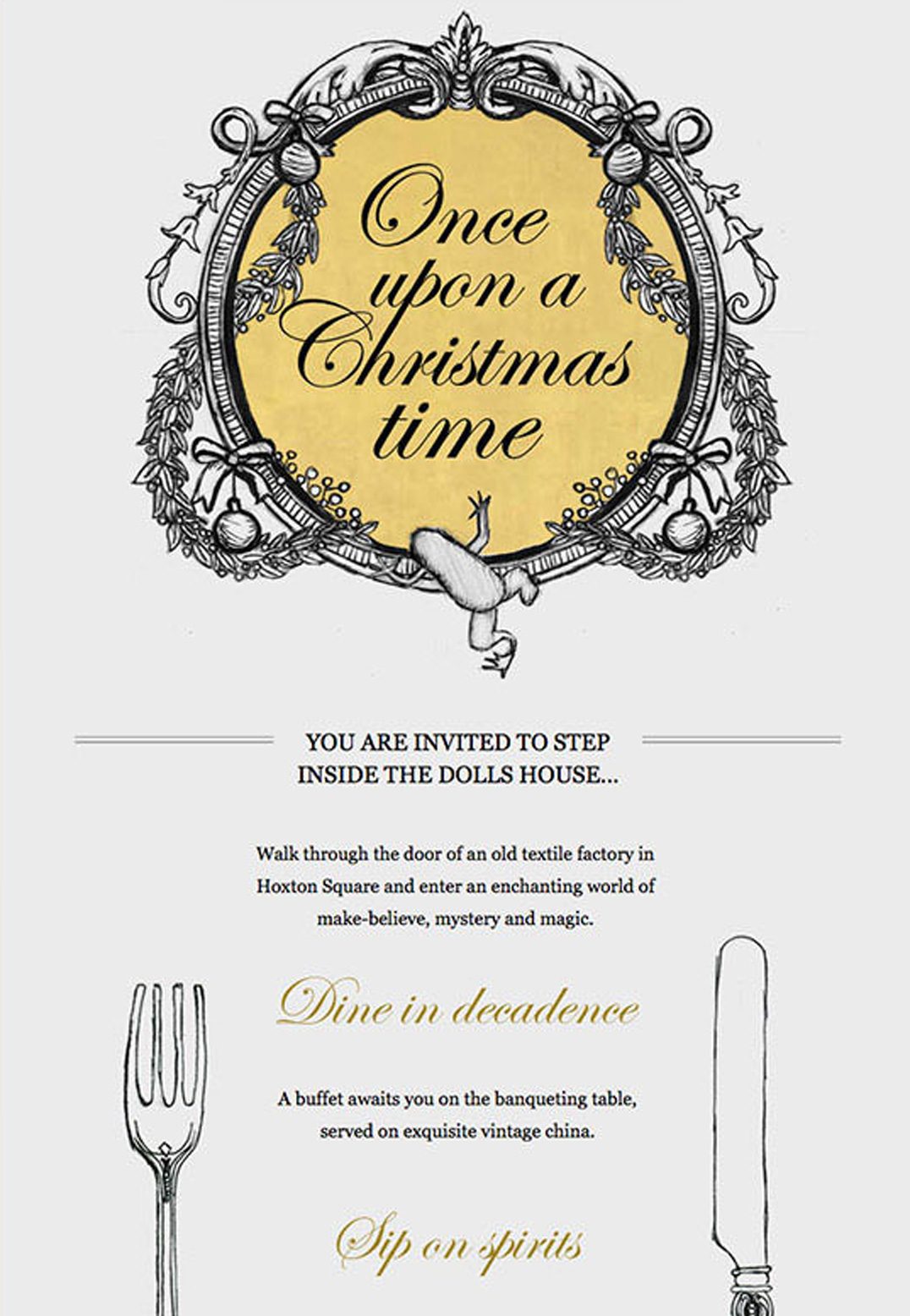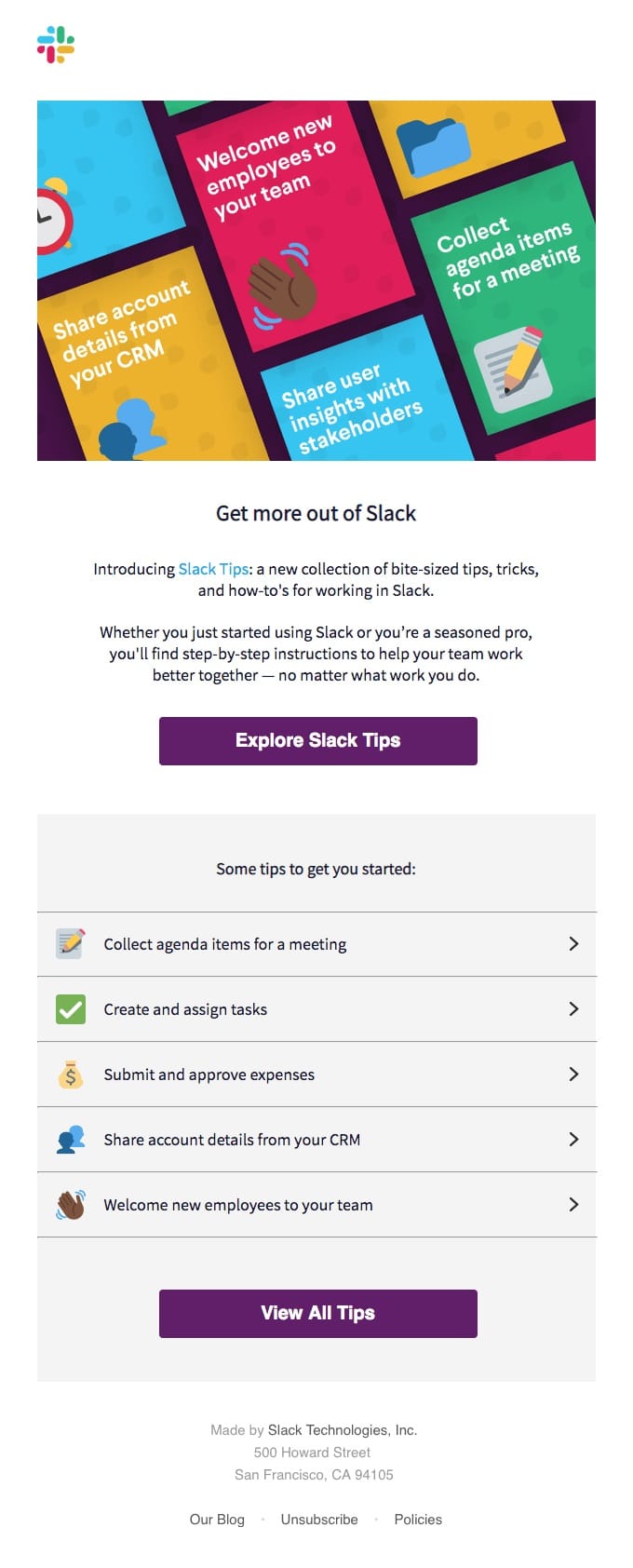Article first published in February 2015, updated June 2019
Sure, a picture may be worth 1,000 words – but only if it’s the right picture. To help you avoid resorting to generic stock photos, we’ll show you the 7 types of images you should be adding to your email campaigns, plus where to find them.
When you find yourself trying to deliver a lot of information via a single email campaign, the first question should really be, “How can I make this simpler?”, or “How can I express this better?”. Instead of overwhelming readers with text, images can often be used instead to summarize ideas or create appeal, and in turn, can help increase an email’s overall click rate.
What is a good email click rate?
An email click rate is the percentage of people who click on a link, image, or video within an email. The email click is also known as an email click-through rate. When it comes to defining what a good click or click-through rate is, it depends on the industry you are in. However, the average amongst all industries is 2.69%.
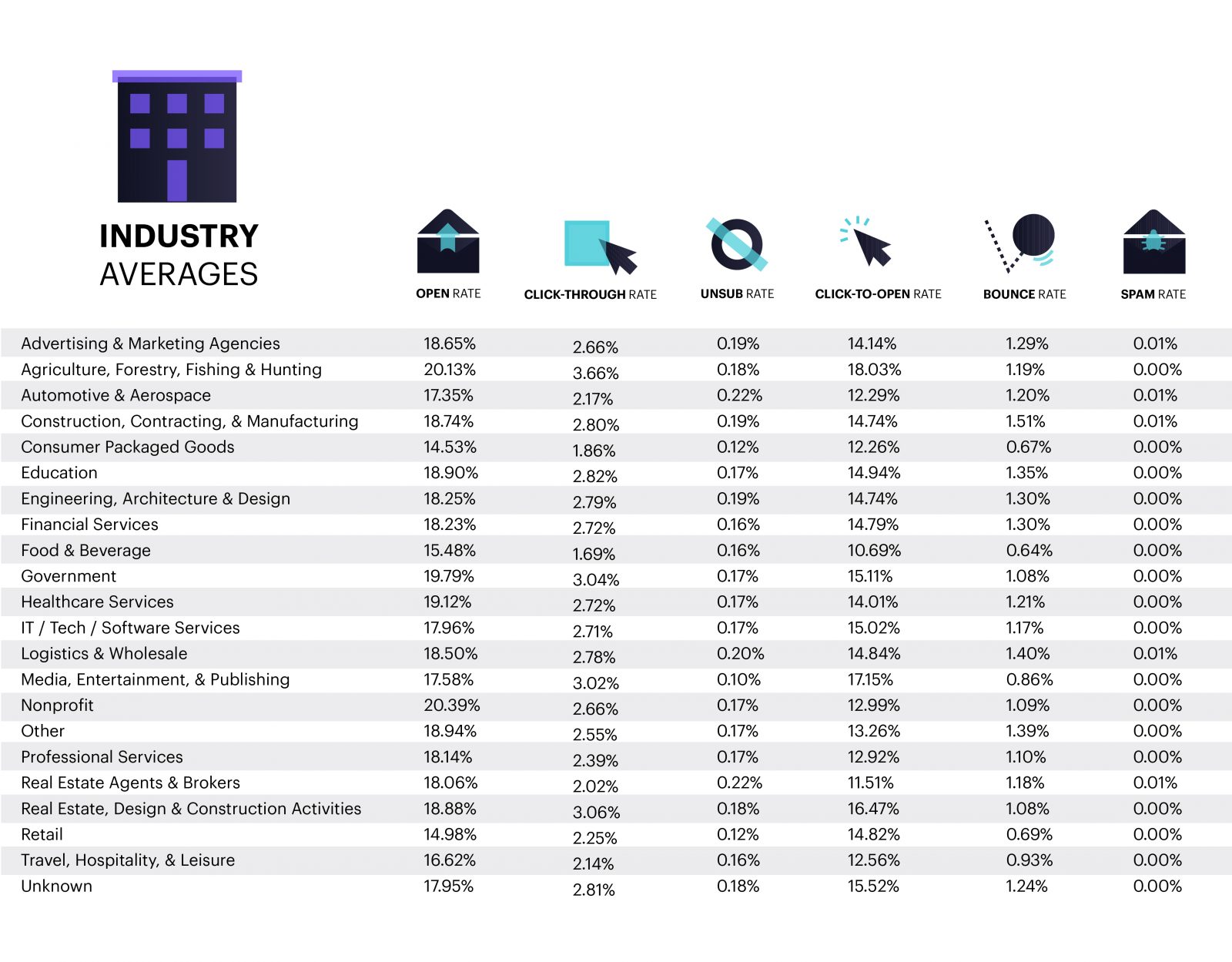 Source: Campaign Monitor
Source: Campaign Monitor
How do you increase email click-through rates?
Increasing an email’s click-through rate can be done in several different ways. Working on creating stronger, more effective subject lines is one way to do this. Your subject lines are the first piece of information your readers see, so, if it’s not compelling them to open the email, then the chances of them clicking on a link within it are slim to none.
Another way to increase your email click-through rates is through A/B testing. This gives you the chance to test various subject lines, content, and images within your email campaign to see what resonates with your audience the most. Once you know what your readers respond well to, you’ll be able to better cater your emails to their wants and needs, leading to better click-through rates.
So let’s get started on a couple of ideas for creating evocative campaigns.
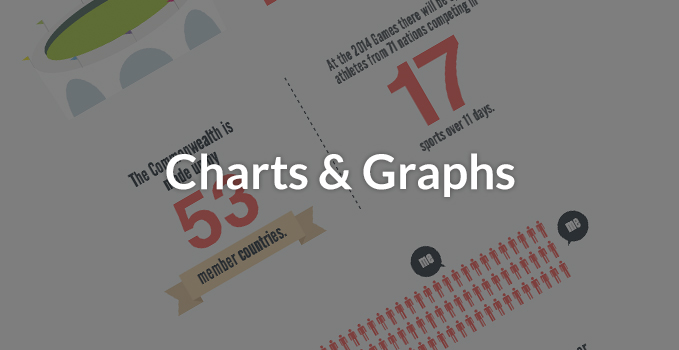
Statistics, reports, and complex data can often be hard to comprehend and see the key messages in, but using charts and graphs to represent the data can make it much easier for scanning readers to grasp the key message you’re trying to convey.
Here are a few tools to help you create charts and graphs for your email campaigns:
- Piktochart – This infographic tool has some great features to help you create beautiful charts. You simply enter your data, select the type of chart and style you’d like, and you’re done. You can then download the charts for free (though they do include a small watermark) or you can upgrade to a pro account to get more templates and watermark-free downloads. This is a great option if you only have a small amount of simple data to visualize.
- Google Sheets or Microsoft Excel – These classic spreadsheet programs can easily turn your data into a wide variety of charts and visualizations. By default, they’re not all that visually appealing, but, with some coaxing and a good design, you can make something pretty decent. Overall, they’re great options if you have a larger or more complex data set you want to visualize.
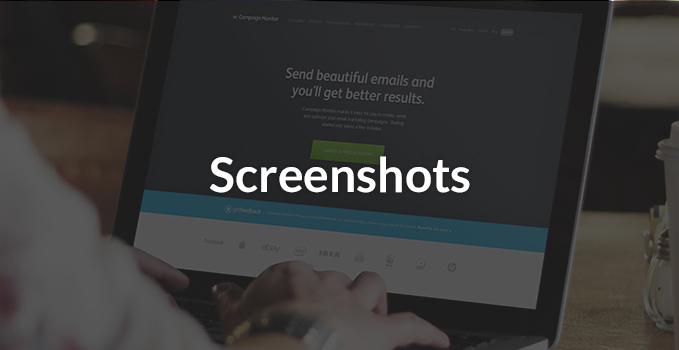
Using screenshots in your email campaigns can be a great way to showcase new features or products. Instead of simply explaining the way your application or website works, give readers a visual overview of it so they can see for themselves just what they could be getting.
Here are a few tools to help you create screenshots for your email campaigns:
- Awesome Screenshot – This handy browser extension for Chrome, Safari, and Firefox make it really easy to capture a screenshot straight from your browser. You can capture the whole page—or just parts of it—and download it straight to your computer. From here, you can simply drag and drop it into your email campaign, and you’re done. We use it when creating screenshots for our Email Design Gallery.
- PlaceIt – This awesome tool makes it easy to capture screenshots and add them into various screens, like a Macbook sitting on a desk or in an iPad sitting on a park bench. It allows you to add that professional image to your screenshots without needing to know photography or photoshop skills. There are plenty of settings to choose from, and you can either upload a screenshot you’ve already taken or enter a URL, and it’ll grab a screenshot directly. All you then need to do is download the image and drag and drop it into your email campaign.
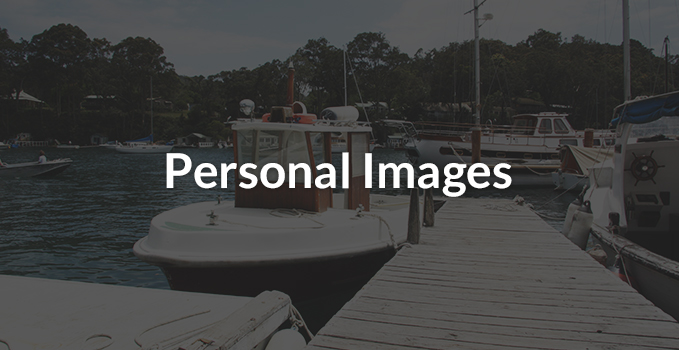
Sometimes you just need a real, personal image of your product or business to show people how great it is. In this case, don’t be afraid to snap a photo yourself and include it in your email campaign. Even if your photo isn’t the highest quality, personal photos might be just the realistic touch your email subscribers are looking for.
Here are a few tools you can use to create great personal images for your campaigns:
- Camera phone – Most people these days have a camera built into their phone, and, if you have a newer model, there’s a good chance the camera is more than capable to taking a picture that can be included in an email campaign. So snap a photo, email it to yourself, and then upload into your next campaign.
- Camera Phone + Lens – If you’re looking to get a little bit more fancy with your photography (but not fancy enough to buy a full DSLR), then you could try using a camera attachment for your smartphone. Tools like the Moment Lens turn your iPhone into a powerful camera capable of capturing beautiful images you’d be proud to include in your email campaigns.
- DSLR – If you want to take some beautiful photos of your products or business to include in email campaigns, then it could be worth investing in a DLSR. Entry-level models aren’t expensive, and, with a little know-how, you can be adding beautifully shot personal images to your campaigns in no time.
Soon, we’ll be posting on how to add Instagram photos to your campaigns using our RSS-to-email service (stay tuned to our blog for more).
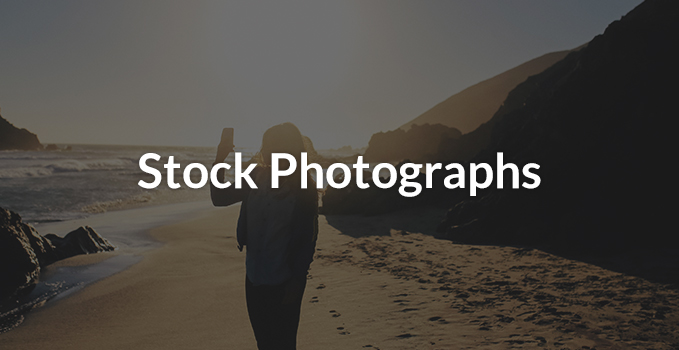
Using the right stock image in your email can create an emotional response to your product or service and, hopefully, convince people to click through. Pictures of amazing food do a great job of, say, enticing people to make a restaurant booking, while images of tropical locations can be enough to inspire people to take a holiday. Think sunny beaches when it’s raining miserably outside.
Unfortunately, though, there are a lot of cheesy stock photos on the web, which could drive away potential conversion.
To find the best stock photography for your email campaigns, check out these sites:
- Death to the Stock Photo – A great site containing hundreds of extremely beautiful stock photographs. You can sign up for the newsletter and get a free pack of photos delivered to your inbox each month or upgrade to a premium plan for $10, which gives you access to the entire library of photos.
- Gratisography – A collection of photos from Ryan McGuire that he’s made free for download and use by anyone. The range is limited, but each photo is beautifully shot and would go great in your email campaigns if you can find one to match your content.
- IMFree – A great site with a solid collection of beautiful stock photographs. Photos are well organized into various categories, which make it easy to find the right image to match your content.
Alternatively, if none of these have the right images for you, check out our post on 8 free sites to get amazing images for your email campaigns for more options.
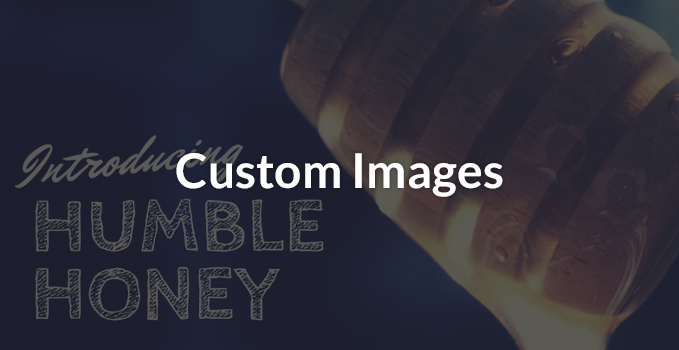
If you can’t find the perfect image for your email campaign, sometimes the next best option is to create your own. Although this can seem daunting for anyone who isn’t a master at Photoshop, it doesn’t have to be high design; it just needs to help get your message across and create desire amongst readers to convert.
Fortunately, there are some great tools out there that allow even those without professional design skills to create great-looking images. Consider trying a tool like Canva, which is great for creating beautiful images for your campaigns. It contains attractive stock images that can be used in your designs, and you can easily add other elements, such as text, banners, frames, and buttons as well. Its drag-and-drop interface is super easy to use, but it still makes you still feel like a design genius.
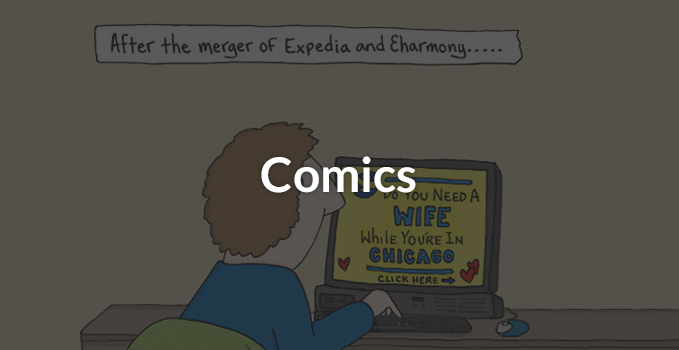
Using comics in your email campaigns can be a great way to make your business and your message seems friendly and approachable. Whether it brings a laugh, a smile, or a nostalgic memory from the past, these kinds of fun images can help make your business more relatable and likable (although you have to be careful not to overdo it).
A great option to consider would be WebDonuts, which is an archive of free comics created by artist Mike Gruhn. If you can find the right one to compliment your message, these beautifully illustrated, humorous comic slides would be a great addition to your email campaign.
![]()
Campaigns with a lot of copy or images can sometimes be a bit overwhelming, so, sometimes, it’s a good idea to use icons to express ideas in an easily scannable way. We commonly see icons used to highlight key features in a product and, unlike more complex photos, they tend to keep the reader focused on the message at hand.
There are plenty of icons available on the web, so we’ve narrowed down the field to a couple of our favorite resources:
- The Noun Project – An online collection of free and paid icons which you can download and use in your marketing content. The site features a great search functionality that allows you to find whatever icons you need for your campaign, and a simple search for terms like “plane” or “book” will return hundreds of icons you can use.
- GraphicRiver – A design marketplace where professional designers sell their work, usually for minimal prices in the $1 to $10 region, depending on the size and complexity of the item. They have thousands of icons available for sale on the site in many different styles, so you’re bound to find something that suits your campaign.
If you don’t have the time to browse through the collections on these sites, you can check out our post on 6 free icon sets you can use in your next email campaign.
3 stunning examples of email marketing images
Email marketing images can be used in, quite literally, thousands—if not millions—of different ways to create stunning images that grab and keep the reader’s attention. Here are three email campaigns that simply took our breath away.
BlueFrog Agency – custom image
BlueFrog Agency makes excellent use of custom imagery with what looks like a hand-drawn image mixed with some graphic design background elements to create their annual holiday party invite. This sets their brand apart from others using more traditional holiday colors and imagery, especially with the elegant use of not only black and white, but also the use of the vintage yellow to grab the reader’s attention.
Source: Campaign Monitor
Takeaway: Custom images can be created with many different types of images, including stock photos, personal photos, and custom artwork, so try a few different styles out to see which suits your brand’s needs.
Slack – icons
Slack does a stellar job creating images that use both popular icons and emojis to relate to their readers. Most slack users are a part of the technology world, so they have at least some knowledge of what each of these icons stands for. Even better, they add a fun, whimsical feel to the email, which makes it warmer and more inviting to readers.
Source: Really Good Emails
Takeaway: You shouldn’t be afraid to have some fun and use icons and emojis in your email imagery. These are great ways to simplify your message in a way that resonates with and entertains readers of all ages.
The Greenbank Hotel – stock photos
Many industries rely on stock photos for their marketing materials. While some stock photography can become overused and stale, the Greenbank Hotel created an absolutely stunning customer email with the use of some stock photos. It’s all about using these photos creatively and with a larger creative theme in mind, which this brand executes beautifully.
 Source: Really Good Emails
Source: Really Good Emails
Takeaway: Use of stock photos doesn’t have to mean stale and boring. Take your time finding the right images and use them creatively. Simply slapping some pictures of a sunset in your email header won’t give readers that same warm feeling as the photos used in the example above.
Wrap up
By using these different types of images in conjunction with our easy drag-and-drop email builder and your snappy email copy, your campaigns can accomplish more than ever.
Want to improve the images in your emails? Check out our piece on three creative ways to do just that.

